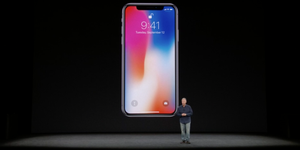
On Wednesday afternoon, CEO Tim Cook issued a letter to Apple shareholders, warning them that the once-trillion-dollar company's first quarter revenue is actually going to be a bit lower than originally expected. Cook lays out a bunch of reasons, including a slowing market in China and the effects of international exchange rates. But all of these factors trace back to something a bit more straightforward: Fewer people are buying new iPhones, which, of course they are.
When the iPhone X dropped in 2017, it was the perfect embodiment of a growing trend in smartphone design: form over function. Which is not to say the function isn't there—the iPhone X and its successors, the XS, XS Max, and XR, are all terrific phones. They are also all expensive phones that offer little in the way of big, life-changing functionality to justify their price tags. The flagship XS line starts at $1,000 and reaches even further upwards.
In its letter, Apple addresses a number of other mitigating factors that certainly contribute to the poor showing for the first quarter of 2019. Sales of the new iPhone XS, XS Max, and XR began in the last quarter of 2018, for instance. But the letter also touches on the growing gulf in value proposition, though in a roundabout way:
While macroeconomic challenges in some markets were a key contributor to this trend, we believe there are other factors broadly impacting our iPhone performance, including consumers adapting to a world with fewer carrier subsidies, US dollar strength-related price increases, and some customers taking advantage of significantly reduced pricing for iPhone battery replacements.
In other words: Folks like you and me are increasingly aware of how exorbitantly expensive our phones actually are now that the skyrocketing prices are not hidden in monthly installments. That, and more of us are taking the sensible option of fixing our otherwise functional phone's most fickle component—its waning battery—instead of buying a whole new gadget.
Cook is not wrong—certainly some macroeconomic effects are mucking up Apple's numbers. But this letter is an illustration of how the rubber meets the road as the smartphone plateau transitions into the smartphone decline. Now that smartphones have gotten about as good as they really need to be, the priorities of smartphone users—a phone that works well for a long time and doesn't cost a fortune—must come into increasingly stark conflict with the incentives of the companies like Apple, whose growth absolutely depend on selling more people increasingly expensive phones every single year.
From an environmental perspective, the phone plateau should be something to celebrate. As the danger of climate change mounts, we need to transition to renewable energy as quickly (if not more quickly) than humanly possible, and the Earth's supply of metals may not be sufficient for that, much less that plus building scads of new smartphones.
Apple, for its part, considers addressing this concern with revamped buy-back programs, which would allow it to both recycle older phones and take the edge off the painful price of newer phones at the same time. Still, Apple's incentive will always be to get you to give up that phone that's perfectly fine, or otherwise convince you that it's not, and the letter concludes with a promise to do so:
[We] are confident and excited about our pipeline of future products and services. Apple innovates like no other company on earth, and we are not taking our foot off the gas.
We'll just have to wait and see what the iPhone XS Max 2 Plus Pro has in store.